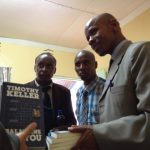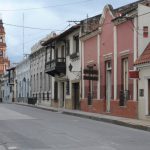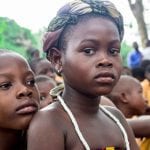Children dressed in rags, scavenging through garbage dumps and begging in the streets for something – anything – to eat . Parents selling their children into slavery because they have no money or food to keep them. Filthy toddlers, abandoned or orphaned, sobbing alone on a muddy road.
As hard as it is to look at their faces, it’s harder still to come to terms with the heartrending story behind the wrenching poverty that now grips so much of Cambodia.
For a people ravaged by the communist genocide that cost the nation a fifth of her population under the murderous Pol Pot regime, the scars are only now just beginning to heal. But the cost to Cambodia’s Christians was far greater. When the Khmer Rouge seized control of the country in 1975, the persecution was savage: 90 percent of Christian Khmers were martyred or fled the country, and by the end of the holocaust, only two trained pastors remained.
The climate for Christians has since improved, despite government rules against door-to-door evangelism and public distribution of tracts. Growth has been unprecedented since the church was allowed to worship openly in 1990. Through God’s providence and His promise in Genesis 50:20, He is opening doors and hearts to the gospel in a way never before seen in Cambodia.
But with that growth comes another challenge, because behind the very tangible human face of poverty, another kind of poverty exists: that of the biblical knowledge needed to shepherd the new faithful. This a poverty we in the West can help alleviate, and is the focus of TGC International Outreach.
Equipping Pastors
Hor, who pastors a Presbyterian church, must contend with both kinds of poverty. He planted the church in 2008, 11 years after giving his life to the Lord, and is at the point now when statistically most pastors in Cambodia are forced to abandon their church leadership jobs and return to secular work to make ends meet. Hor, 36, his wife Esther and 5-year-old son Joseph have lived alongside his people in poverty, living in a small room on church grounds and parceling out an average salary of $200 to $300 a month to the congregation’s widows and orphans, needy members and poor children in the nearby villages with emergency medical crises.
“This amount of salary makes it so hard for Cambodians to afford to buy books and other teaching materials,” said Hor, whose seminary studies at Far Eastern Bible College in Singapore gave him a solid, reformed grip on doctrinal truths that most younger, less biblically mature Cambodian church leaders have not yet attained.
“There is a big need for solid Christian resources in Khmer, and it is so hard to find books in my language,” said Hor. “The greatest need of the Cambodian pastor is training, resources and teaching/learning materials.”
A book like Mark Dever’s “What is a Healthy Church?” is an invaluable resource to church planters committed to giving their congregations a right understanding of the Word. For Pastor Hor, whose congregation has grown from about 10 in its infancy to more nearly 200 members now, imparting such key gospel truths to his people is imperative, as is preparing the younger disciples to lead the next generation of believers.
“This project helps pastors in Cambodia so much to grow in Christian knowledge,” he said. “And it helps to pass that knowledge on to my church.”
A Sacrifice and a Legacy
In 1973, speaking at a conference in England, Cambodian leader Chhirc Taing spoke passionately and poignantly to Western church leaders about Khmer Christians’ grave need for help:
“God has given you blessings upon blessings so that today you have many churches in which to worship him and learn from his living Word,” he entreated. “You have plenty of books, booklets, tracts and films telling you about the true God; you have worship services on television every Sunday, and services on the radio each morning. God has given you wonderful things.
“Give us the right to believe in Jesus Christ the true God, on whom you have believed for many, many centuries.”
For Chhirc Taing, who returned to his country to advance the gospel knowing he would be killed, the need was so profound that no sacrifice was too much to make. He was murdered days after the Khmer Rouge took over in 1975.
The need is no smaller today, but the sacrifice asked of us now is incomparably less.
Your gift to TGC’s Cambodian Relief Project could provide the spark that leads to a gospel awakening in this needy, hope-starved country.
*Sources: OMF International; The Lausanne Movement; Bureau of Democracy, Human Rights and Labour International Religious Freedom Report in 2010; The Gospel Coalition
































